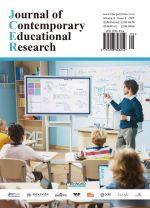Exploration and Application of AI Technology in Molecular Biology Experimental Teaching
Abstract
Artificial intelligence (AI) technology is increasingly used in the field of education, but its application in molecular biology experimental teaching still faces challenges. In order to explore the application prospects of AI technology in molecular biology experimental teaching, this paper discusses the application of AI technology in molecular biology experimental teaching, focusing on the construction and application of virtual laboratories. At the same time, the advantages, challenges and future development directions of AI technology application are analyzed. The study found that AI technology has broad application prospects in molecular biology experimental teaching. AI technology can overcome many limitations in traditional experimental teaching, and can also provide personalized learning experience, real-time feedback and evaluation, and simulate complex molecular processes. However, the application of AI technology also faces challenges such as technology cost, teacher training, and curriculum design. In summary, the application of AI technology in molecular biology experimental teaching has significant advantages and can effectively improve teaching quality and learning effects. In the future, we should strengthen the integration of AI technology and traditional teaching methods, develop more AI teaching tools suitable for the characteristics of molecular biology, and focus on cultivating students’ practical ability and innovative thinking. This study provides new ideas and directions for promoting the reform and innovation of molecular biology experimental teaching.
References
Yang P, Ye Z, Xie S, et al., 2024, “Everyone Learns AI”: What Exactly to Teach and How?, Xinhua Daily, July 18, 2024.
Morimoto J, Ponton F, 2021, Virtual reality in biology: could we become virtual naturalists?. Evo Edu Outreach, 14(7): 3–13.
Zhang Y, Wang L, Li W, 2023, Exploration on the construction and teaching reform of molecular biology experiment course. China Educational Technology & Equipment, 2023(2): 136–138.
Espinosa C, Becker M, Marić I. et al., 2021, Data-Driven Modeling of Pregnancy-Related Complications. Trends in Molecular Medicine. 2021(27):762–776.
Akhtar M, Anderson M, Cochrane T, 2024, Implementing Augmented Reality and Virtual Reality for authentic healthcare education: Technology enhanced healthcare education for low resource settings with a focus on Australasia. Pacific Journal of Technology Enhanced Learning, 6(1): 2–3.
Christopoulos A, Mystakidis S, Cachafeiro E, et al., 2023, Escaping the cell: virtual reality escape rooms in biology education. Behaviour & Information Technology, 42(9): 1434–1451.
Hazaymeh W, Bouzenoun A, Remache A, 2024, EFL Instructors’ Perspective on Using AI Applications in English as a Foreign Language Teaching and Learning. Emerging Science Journal, 202(8): 73–87.
Avşar G, Çelik Ş, Doğan S, et al., 2024, Virtual Reality Technology in Nursing Education: A Qualitative Study. European Journal of Education, 2024: e12780.
Serin H, 2020, Virtual Reality in Education from the Perspective of Teachers. AMAZONIA, 26(9): 291–304.
Chuang T, Chou Y, Pai J, et al., 2023, Using Virtual Reality Technology in Biology Education: Satisfaction & Learning Outcomes of High School Students. The American Biology Teacher, 85(1): 23–32.
Pedersen K, Musaeus P, 2023, A phenomenological approach to virtual reality in psychiatry education. Frontiers in Virtual Real, 2023(4): 1–18.
Howard M, Davis M, 2023, A Meta-analysis of augmented reality programs for education and training. Virtual Reality, 27(4): 2871–2894.
Niu M, Lo C, Yu Z, 2021, Embedding Virtual Reality Technology in Teaching 3D Design for Secondary Education. Frontiers in Virtual Reality, 2021(2): 661920.
Nash J, 2024, Abstract 1795 Navigating the AI Disruption: Tailoring Teaching for the Future. Journal of Biological Chemistry, 2024(300): 105794–105794.

